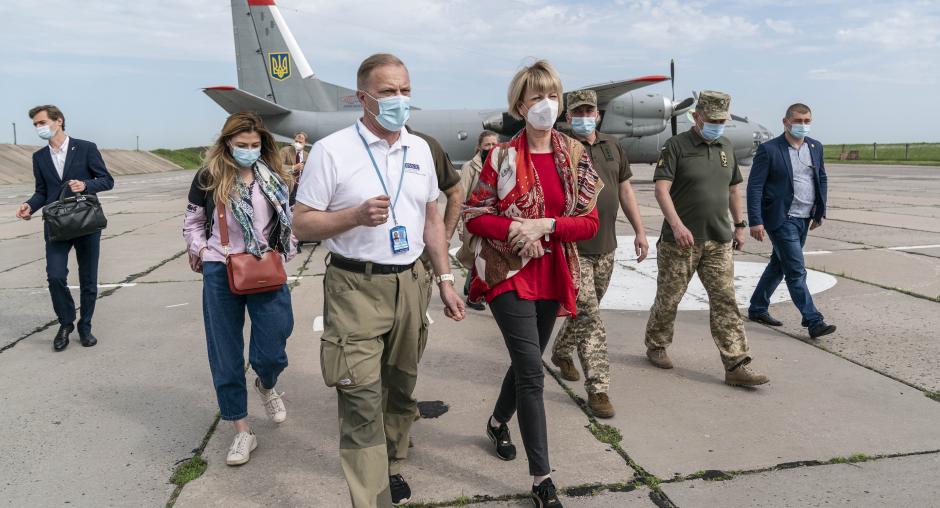OSCE Secretary General Schmid concludes visit to Ukraine

KYIV, 31 May 2021 — OSCE Secretary General Helga Maria Schmid concluded a five-day official visit to Ukraine yesterday. She underscored the OSCE’s continued commitment to supporting efforts toward a sustainable, peaceful resolution to the crisis in and around Ukraine.
In Kyiv, Schmid met with Deputy Prime Minister and Minister for Reintegration of the Temporarily Occupied Territories of Ukraine, Oleksii Reznikov, Foreign Minister, Dmytro Kuleba, Head of The Presidential Administration, Andrii Yermak and speaker of the Ukrainian Parliament Dmytro Razumkov. They spoke about the further work needed toward a peaceful resolution of the crisis. They also discussed the continued co-operation between Ukraine and the OSCE to enhance security and improve lives throughout the country.
Schmid also met the leadership of Ukraine's Delegation to the OSCE Parliamentary Assembly, Mykyta Poturaiev, Artur Gerasymov and Hryhoriy Nemyria. In meetings with the United Nations Resident Coordinator, Osnat Lubrani, and Head of Delegation of the International Committee of the Red Cross, Florence Gillette, Schmid agreed on the critical importance of free access for humanitarian organizations, especially in non-government-controlled areas. She also spoke with women civil society representatives about their work on gender equality and mediation.
“Over the past few months, we have seen tensions worsen and ceasefire violations increase. It is a reminder of just how fragile the situation is,” Secretary General Schmid said. “The OSCE will continue to do all we can, but it will take sustained political will and engagement to bring this crisis to an end. People deserve enduring stability and security in their daily lives.”
In talks with the Chief Monitor of the OSCE Special Monitoring Mission to Ukraine (SMM), Halit Çevik, and Special Representative of the OSCE Chairperson-in-Office in Ukraine and in the Trilateral Contact Group (TCG), Heidi Grau, Schmid praised the important role played by SMM staff and the co-ordinators of the TCG in facilitating progress on implementation of the Minsk agreements. They also discussed the ongoing challenges the SMM faces in carrying out its work.
“The SMM plays a vital part facilitating dialogue and serving as the world’s objective eyes and ears on the ground. I have heard appreciation from everyone I met for the excellent work done by SMM staff, despite often challenging circumstances,” she said. “But incessant restrictions and impediments prevent the Mission from fulfilling its mandate. I saw for myself how repeated jamming interferes with SMM’s unmanned aerial vehicles. The SMM must be able to work safely, securely, and unhindered on both sides of the contact line.”
The Secretary General also noted the continuing impact of landmines on the civilian population, as well as the SMM, as highlighted by the SMM thematic report published on 28 May. She stressed the urgent need to end minelaying and to make progress on humanitarian demining.
Schmid met with the OSCE Project Co-ordinator in Ukraine (PCU) Henrik Villadsen and his staff. She commended their dedication and commitment despite numerous challenges and emphasized the importance she places on supporting their work throughout the country.
The Secretary General travelled in the east of the country, accompanied by Deputy Foreign Minister Emine Dzhaparova. They visited the Novotroitske entry-exit checkpoint. Schmid noted the difficult situation of conflict-affected people, which is exacerbated by the partial closure of crossing points, and the importance of ensuring freedom of movement across the contact line, including re-opening all crossing points and opening new ones. She also discussed with Head of the Donetsk Regional State Administration, Pavlo Kyrylenko, efforts to mitigate the impact on the civilian population.
She saw the practical impact of the SMM’s work and activities carried out by PCU, including its environmental protection efforts in the Siverskyi Donets river basin, one of the country’s most vulnerable water bodies and a source of water for millions of people. She also met youth activists working on a range of activities in the Donetsk region and underlined the importance of the contribution of young people.
